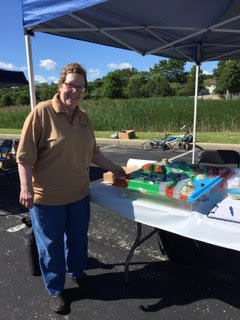 Rosemary at the Buffalo Grove Green Fair last summer, demonstrating our Enviroscape watershed model. Rosemary at the Buffalo Grove Green Fair last summer, demonstrating our Enviroscape watershed model. Thanks and congratulations to Rosemary Heilemann, our 2018 Palleon Award Winner. Rosemary is a member of the League of Women Voters Deerfield/Lincolnshire (IL) and also the League of Women Voters of Lake County (IL). She is an active volunteer with us and other Leagues, as well as outside groups such as the Sierra Club. Water protection is a frequent goal of her education and advocacy efforts. The Palleon Award was established in honor of past board member Art Palleon, who was a proponent of vigorous advocacy efforts. It was awarded to Rosemary at our 2017 Annual Meeting in Green Bay, Wisconsin. Rosemary is the first off-board recipient of the Palleon Award. On July 3rd, show your support for our Great Lakes, and water protection more generally. Like-minded people all around the lakes will SHOW UP to make their support visible by attending events at 10 am (Eastern Time) to join hands and pass a marble.
Events are already planned in many locations, but if there isn't an event near you, you are invited to organize one. This would be a terrific, quick project for a local League! All the information, including locations, is available from All Hands on Deck. We're excited that, working with our partner, the LWV of Illinois Education Fund, we've purchased two watershed demonstration models. The models will be used to help the public visualize the many potential sources of water pollution, as well as solutions to prevent and clean up pollution.
We are grateful to the Illinois Department of Natural Resources for a Coastal Management grant that allowed us to purchase the models. We'll be debuting the models this summer in Illinois Lake Michigan coastal communities. Volunteers will be trained to use them. Check our calendar for opportunities to see them in action. HR 861 "to Terminate the Environmental Protection Agency" has been referred to several committees in the House since its introduction on Friday, Feb. 3. We are proud Judy Beck and Jeanette Neagu, members of our board, rallied to Save the EPA today in Chicago.
Many existing environmental laws establish that they will be administered by the EPA, so we are not sure how this bill would work. Currently there is no published text or summary. Keep watching for the details, and we will, too.  #goals #goals Charlotte Adelman, one of the leaders of our upcoming (sold-out!) tour of native plant gardens in Wilmette, Illinois, is an expert on native plants. So which books on native plants has she found useful? She was kind enough to share her favorites with us. Whether you are taking the tour or not, check out the following books to learn about native plants' many environmental benefits and gain insights into how to incorporate them into your own garden:
Charlotte herself is the author of The Midwestern Native Garden: Native Alternatives to Nonnative Flowers and Plants and the forthcoming Midwestern Native Shrubs & Trees: Gardening Alternatives to Nonnative Species. We are lucky and pleased to be able to share her expertise with our members and others who care about the Lake Michigan ecosystem! 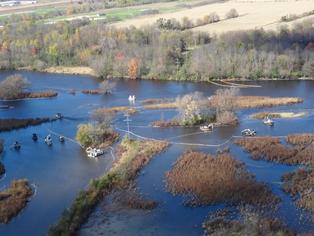 2011 clean up work of the Enbridge oil spill (credit: www.michigan.gov at http://bit.ly/29VG65p) 2011 clean up work of the Enbridge oil spill (credit: www.michigan.gov at http://bit.ly/29VG65p) The LWV Lake Michigan Region Annual Meeting in Douglas, Michigan back in 2011 included a paddleboat cruise on the Kalamazoo River, narrated by LWVMI delegate Suzanne Dixon. Instead of talking about the natural beauty or a thriving local ecosystem, our group learned about the environmental disaster caused by the oil spill from an Embridge pipe leak. Today, the U.S. EPA and the Dept. of Justice today announced a settlement with Enbridge Energy Limited Partnership (and several related companies) to resolve claims stemming from its 2010 oil spills in Marshall, MI and Romeoville, IL. Enbridge has agreed to spend at least $110 million on measures to prevent spills and improve operations across nearly 2,000 miles of its pipeline system in the Great Lakes region. These measures include:
Enbridge will also pay civil penalties totaling $62 million for Clean Water Act violations. Enbridge has already reimbursed the government for $57.8 million in cleanup costs from the Marshall spill and $650,000 for cleanup costs from the Romeoville spill, and Enbridge reportedly incurred costs in excess of $1 billion for required cleanup activities for these spills. “This was one of the largest inland oil spills in U.S. history when Enbridge discharged one million gallons of oil to Talmadge Creek near Marshall,” said acting EPA Regional Administrator Robert Kaplan. “Together with our state and local emergency responders, EPA was able to contain the spill before it reached the Great Lakes. After 22 months of arduous cleanup work, the Kalamazoo River finally reopened for recreational activities.” The government’s complaint alleges that on July 25, 2010, Enbridge's 30 inch-pipeline known as Line 6B discharged at least 20,082 barrels of crude oil, much of which entered Talmadge Creek and flowed into the Kalamazoo River which flows to Lake Michigan. Flooding caused by heavy rains pushed the discharged oil over the river's banks into its flood plains, and accelerated its migration over 35 miles downstream before it was contained. Line 6B, which originates in Griffith, IN, crosses the lower peninsula of Michigan and ends in Sarnia, Canada, has since been replaced with a new, larger pipeline, also known as Line 6B. The complaint also alleges that on September 9, 2010, another Enbridge pipeline, known as Line 6A, discharged at least 6,427 barrels of oil in Romeoville, IL, much of which flowed through a drainage ditch into a retention pond in Romeoville. There will be a 30 day public comment period on the consent decree. Information on how to comment will be available in the Federal Register and on the Department of Justice’s website: www.justice.gov/enrd/consent-decrees. More info on the settlement is available at https://www.epa.gov/enforcement/enbridge-clean-water-act-settlement Thanks to all who joined us for our sold out Sustainable and Invasive Fish Dinner 2016. Funds were raised to support our work and we learned a little about the fish in our Great Lake. It was a good time to connect with others concerned about Lake Michigan and we shut the place down!
Thanks also to Dirk and Terry Fucik, who graciously hosted us for the third fundraiser at Dirk's Fishmarket in Chicago, for the delicious food and sharing the recipes! Congratulations to the Healing Our Waters Coalition for organizing a terrific Great Lakes Days event in Washington DC. Leaguers played an important part of this group of over 100 Lake lovers who convened in February to get updates on the successes of the Great Lakes Restoration Initiative, hear speakers, and participate in in-person meetings with elected representatives and staff on Capitol Hill. One of our most effective handouts for making our case is a description of restoration successes from around the Great Lakes region, which can be accessed here .
The Great Lakes Restoration Initiative (GLRI) is an inter-agency program designed to address the most significant problems in the Great Lakes and works to protect, restore and maintain the Great Lakes Ecosystem. It has traditionally enjoyed bi-partisan support. At our Congressional breakfast both Republicans and Democrats from both Houses addressed the group in support of our work. Unfortunately, President Obama’s current budget requests only $250 million for FY 2017. We were lobbying to have that amount restored to $300 million to maintain the current level of funding because, although GLRI is showing real and measurable results, there is still plenty of work to be done. LWVLMR supports authorization and multi-year funding of $300 million per year for the GLRI and encourages you to contact your federal legislators in support of this position. The visit was timely as there is heightened concern about drinking water across the states, due to the crisis in Flint, MI. So in addition to the request for GLRI support, we were also asking for a boost to the Clean Water and Drinking Water State Revolving Fund programs that help local communities upgrade aging water infrastructure to protect drinking water, reduce sewer overflows, and prevent beach contamination. Additionally, protection against Asian carp and other invasive species coming through the Chicago Area Waterways was sought, with emphasis on speeding up the Brandon Road Feasibility study by the Army Corps of Engineers. Brandon Road is the site of a Lock and Dam on the Illinois River and was identified as a possible choke point to stop the fish in a previous study which we lobbied for. All of our Great Lakes LWV states except Pennsylvania are members of the Healing Our Waters Coalition. Their annual conference will be September 20-22, 2016 in Sandusky, OH this year and we encourage League members to attend. NATIVE PLANTS HELP CLEAN WATER, NATURALLY!
We are thrilled to have learned that we will be able to continue spreading that message with the aid of an Illinois Department of Natural Resources Coastal Management Mini-Grant! The grant will fund the development and production of outreach materials and one or more mobile workshops in summer of 2016. We are extremely grateful for this opportunity! Materials will be available for no cost to the local Leagues in the Illinois Coastal Zone, and to other LWVLMR member Leagues at cost. We look forward to working again with local Leagues on this project. More information about this project will be available early in 2016. The LWVIL Education Fund will administer the grant. This is the second coastal management grant LWVILEF and LWVLMR have received; the first funded the first phase of the Stormwater Education project through 2014. The UMRR (pronounced "ummer") ILO had its very successful inaugural meeting over the weekend. Almost 50 local Leagues in Minnesota, Wisconsin, Iowa and Illinois have joined.
The group is so new, it doesn't have its own website or facebook page yet, but stay tuned, and we'll post an update when available. |
Archives
December 2017
Categories
All
|

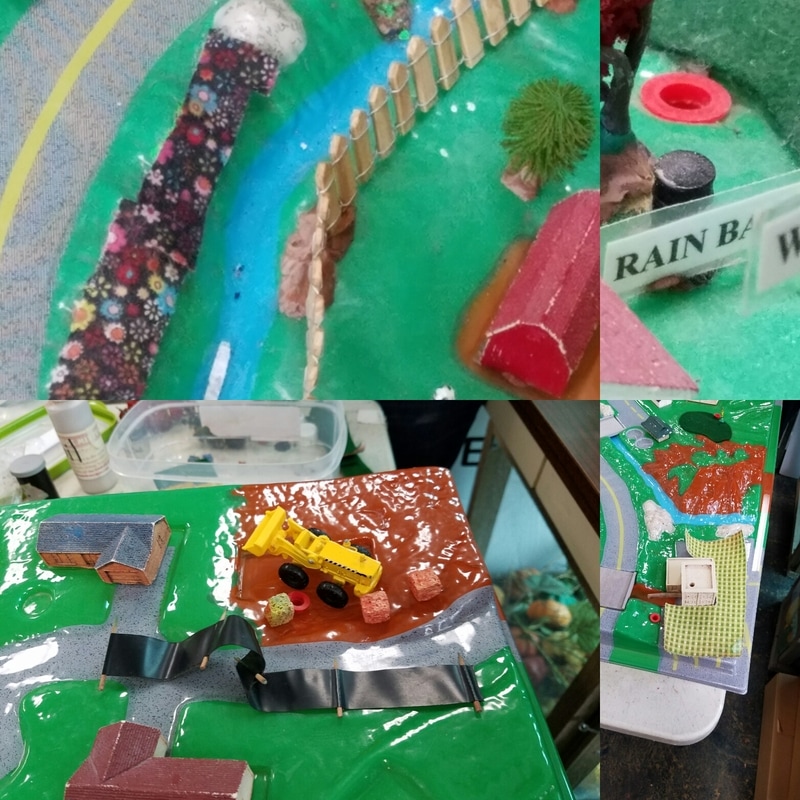
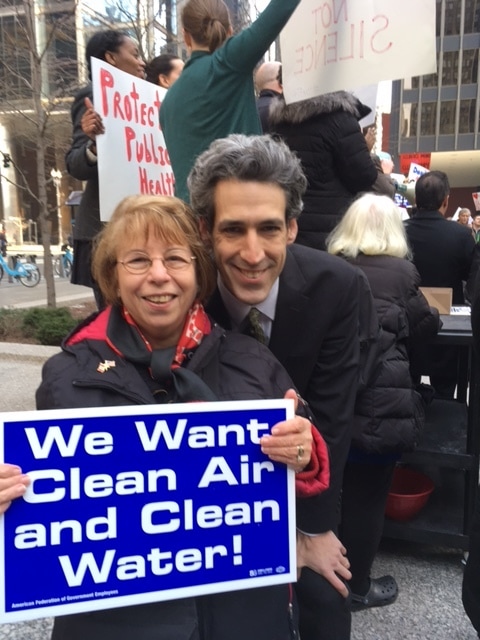
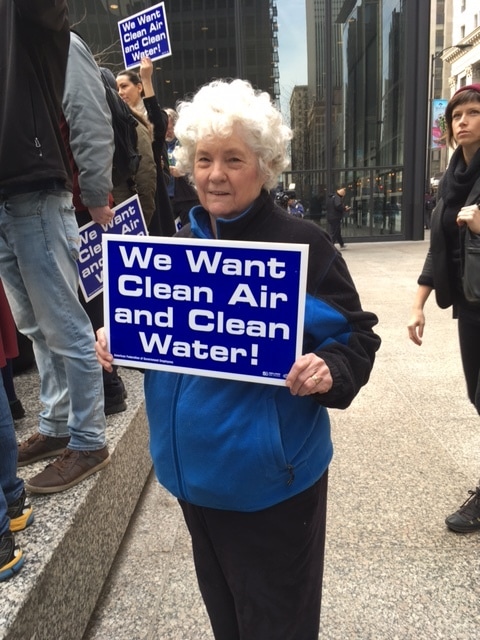
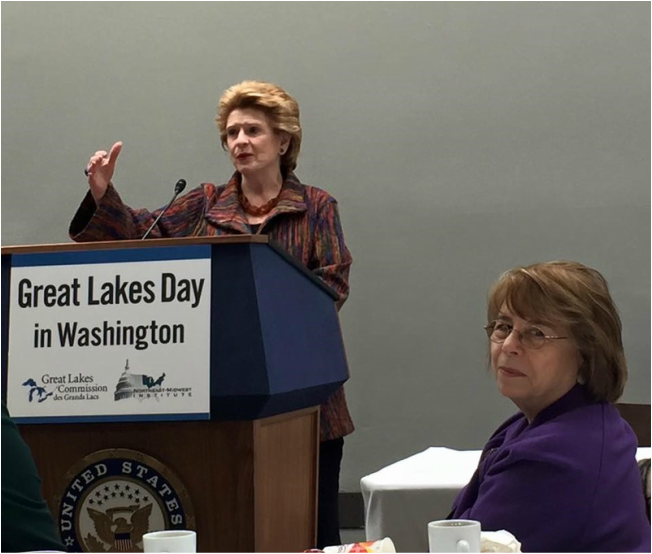
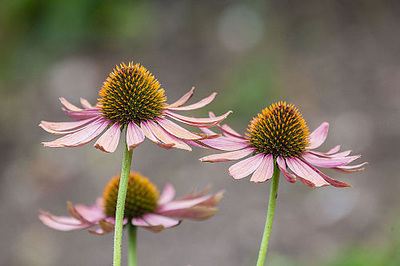
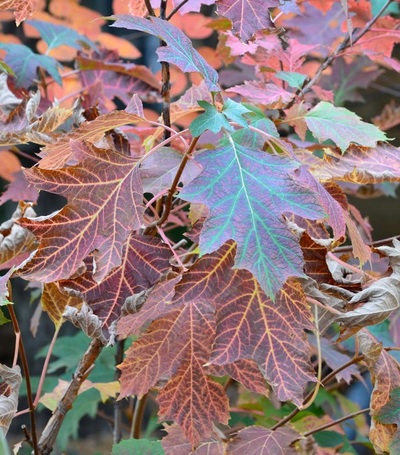
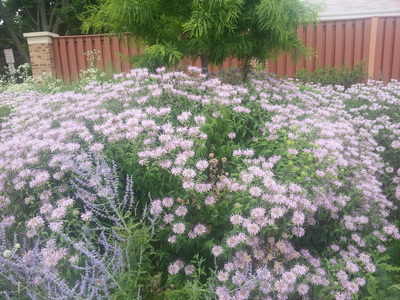
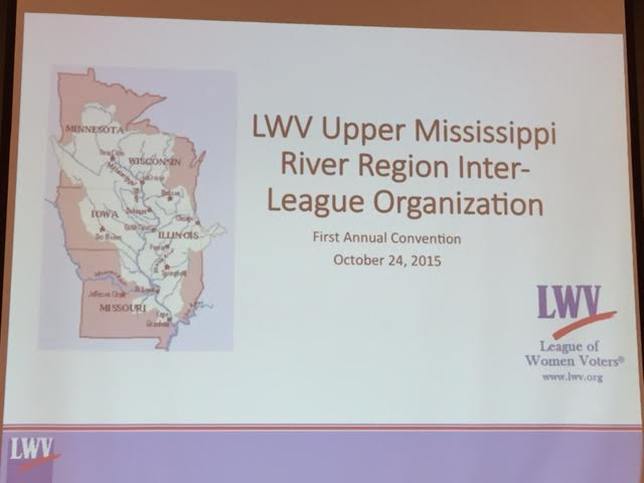
 RSS Feed
RSS Feed